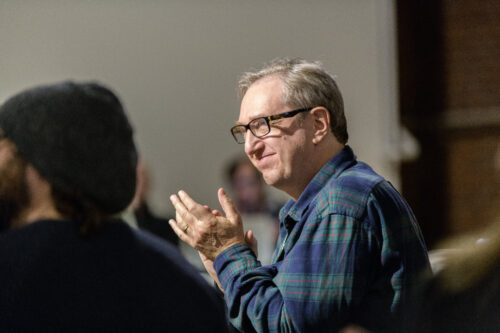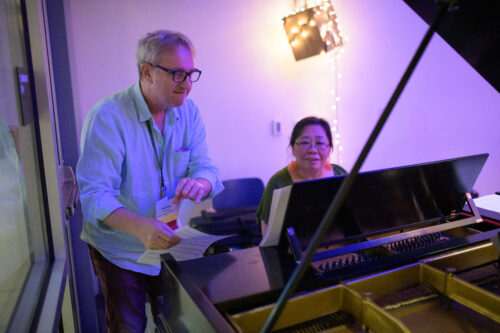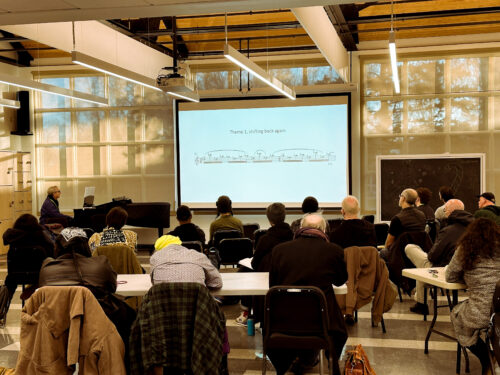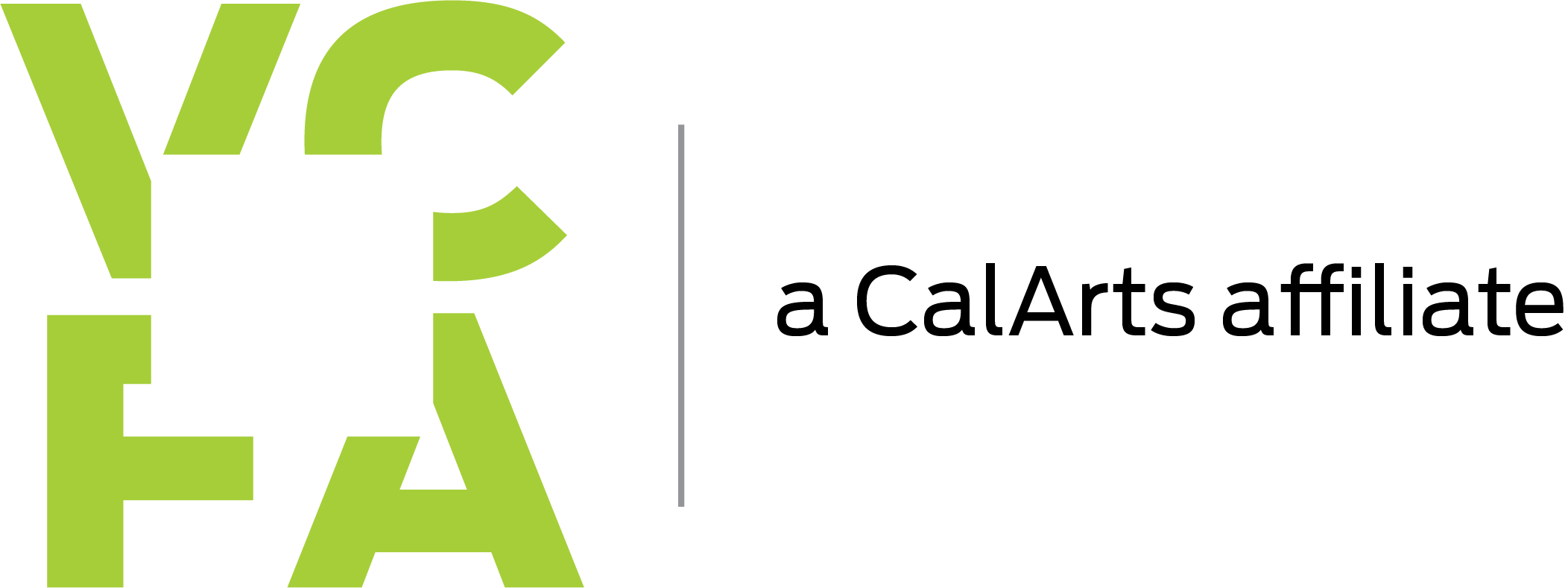FACULTY STORY: Rick Baitz
 Composer Rick Baitz is a founding faculty member of the VCFA MFA in Music Composition Program. Established in 2011, the VCFA MFA in Music Composition Program grew its roots in the low-residency mentorship model, and provides composers with the unique opportunity to have their compositions professionally recorded while in residency.
Composer Rick Baitz is a founding faculty member of the VCFA MFA in Music Composition Program. Established in 2011, the VCFA MFA in Music Composition Program grew its roots in the low-residency mentorship model, and provides composers with the unique opportunity to have their compositions professionally recorded while in residency.
Baitz has been a VCFA faculty member since the beginning, and served as Faculty Chair from 2012 to 2016. As a tenured professional in the music industry, Baitz has had his compositions performed at venues such as Carnegie Hall, Merkin Hall, and The Cell. Much of Baitz’s career has focused on film scoring, with credits such as the award-winning documentary What She Said: The Art of Pauline Kael, HBO’s The Vagina Monologues, and National Geographic’s mini-series Heart of Africa. Baitz has not only brought his years of experience to his role as a faculty mentor to students at VCFA, but new ideas that helped shape the Music Composition program into what it is today.
VCFA sat down with Baitz to talk about how the Music Composition program came to be and how it’s impacted its students over the years. Watch our video interview with Baitz, or read the transcript of our interview below.
Learn more about Rick Baitz and his work at rickbaitz.com.
Interview Transcript
My name is Rick Baitz, he/him. My role is a faculty member. I’m a core faculty member and a former Faculty Chair.
Q: Tell us a bit about yourself and your background.
A: I’ve been there since the very beginning—even before the beginning. We had our first meeting in 2010 about putting together the program. The first residency was in the summer of 2011, so I’ve been there ever since.
 Q: How did you end up at VCFA? And what makes the VCFA MFA in Music Composition program unique?
Q: How did you end up at VCFA? And what makes the VCFA MFA in Music Composition program unique?
A: From around 19—I don’t know—1975 or 1976 to until 1992 I taught, but then that was right at the same time I started doing film music, and I decided to just devote myself completely to that. So I had been letting my teaching go. I let it all go, and I was just doing film music. Before that, I was only doing concert music pretty much, and had just, in 1991, got a doctorate in composition from Columbia. But I didn’t really want to use it for teaching. I wanted to use it for learning.
I grew up in LA, but at the age of 14, moved to Rio de Janeiro, Brazil with my family. My dad was transferred for business, and at 17, to South Africa. Those locations had a very, very powerful effect on me, musically and otherwise—spiritually, psychologically, politically. Every, every possible way. I saw this ad, they were actually looking for a Chair for this new program that they were putting together, VCFA. And the way they described it, they were describing me. It was a program that would provide mentorship in not only all forms of contemporary classical composition, but in film scoring and jazz composition and songwriting and electronic music, and that struck me in the heart, because that is kind of where music as an art form is really going.
So I thought it was a very, very creative model for a composition program. I didn’t know any others in the country like that, like none, and I still don’t. I mean, in a way, CalArts is one of the places that comes closest.
I inquired about the Chair position, but they actually already had someone and basically offered me a position as faculty. So I first came in as faculty for the first year, and then Tamar left, and they asked me to be Chair, which I did for four years from 2012 to 2016.
That first meeting, though, that I attended, there were some faculty members there that are still around, and it was in Boston, in someone’s house, and we were just brainstorming on how this program was going to work. Frankly, I don’t remember too much about that meeting. Everybody was a little shy. I wasn’t, but everybody else was. Carol Beatty was there, who was, and still is, our Program Director. And so I think it mostly just involved the nuts and bolts of what the residencies would look like and what the program would look like. So when the program first started, our first residency was in 2011.
What kind of makes this program unique at VCFA is that performances, or the way that our students’ art actually manifests, happens in the residency. There are performances of student works that are in the residency, and so students work on a project, and they work remotely with their mentor in between the residencies.
Q: What are some of the programs that take place at residency?
A: We started the Songwriter Showcase because what I figured out was we needed a platform for all of the different genres to have, you know, their space to express themselves. So we did the Songwriter Showcase. I started what I used to call the Film Music Festival. Now it’s called the Film and Media Music Festival, which is just a concert of student film scores. Faculty member John Malia followed up by starting the Electronic Music Showcase, and so we had something for everybody. Soon, somebody started a choral workshop. Later, Roger Zahab started the Composer, Performer, Improviser Concert, which is for composers who improvise and also perform their own music. So it got built from just this very beginning of having one ensemble. I mean, it’s like, really challenging, because these ensembles were playing a lot of pieces, and we finally had to limit it. When I was Chair, we limited it to 12. But even that’s too much, because they don’t have a lot of rehearsal time. They have at the most two one hour rehearsals.
So we put together this pretty amazing program. I have studied many of the composition programs around the country, and I don’t know any that do what we do. I mean, as I said, CalArts is about the closest. I looked at that very carefully, long before we affiliated with them. So that, to me, is a kind of marriage made in heaven.
Q: What influences your music?
A: You know, art is open and expansive and inclusive and curious. If you look at visual arts, they don’t call somebody who’s a sculptor and somebody who’s a painter and somebody who does performance art not an artist. They’re all artists. They all might have even gone to the School of Visual Arts at one time or another. And it’s the same with music, you know, somebody who’s doing electronic music and incorporating rock and roll or Brazilian or African stuff like I do in my music.
I’m so moved by the power of rhythm that I heard in Brazil as a 15 year old during Carnival and the power of the drumming I heard in Africa as a 17 year old, late at night, just hearing people playing. Actually, one time, I was invited by these Zulu musicians to come sit with them while they were basically playing in the jungle. They invited me to come sit with them because I had long hair. This is during apartheid. [Long hair] was quite a signifier for somebody who was not a racist, actually. But these were very, very powerful experiences, and I incorporate that into my music. But I also consider myself part of a tradition, a very long and ancient tradition of quote/unquote classical composers, whatever that means. People who use dance forms—like Bartok and Copland. Even Beethoven, even Bach, wrote dance music—Stravinsky. So I’m part of that as well. I use folkloric elements in my music, and I use jazz and rock and roll in my music.
Q: What’s it like to be a part of the VCFA Music Composition Community? And can you tell us about the faculty in the program?
A: We get a really, very diverse population coming to us. We’ve had people in their 80s and people in their early 20s in our program. People from all walks of life—people who come from the church, people who come from the military, people who’ve had careers in music but don’t have a degree and want to teach, people who wanted to have a career in music but went in some other direction, and then come back in middle age, or even older, or some point in their lives. All of our programs are like that. We get neurodiverse people.
And then there’s just this kind of magic between us as faculty. We’re like a family. We make our decisions on consensus, and we can disagree on things. But we basically all love each other, and it’s an amazing celebration for 14 years to be coming back twice a year and hanging out in this intense environment together for nine days. 
Q: How do students grow in the MFA in Music Composition program?
A: At some point during our program, [people] have some kind of cathartic growth. It’s amazing to see. Suddenly they come in with a piece of music, and we’re all going, oh my god, and sitting there with chills up our spine. Like, what happened to this person, you know? They realized it is okay to be weird, because weird is good! Look how weird Beethoven was, with his strange harmonies and strange structures and stuff.
Q: Can you share a transformative experience you witnessed at VCFA?
A: There was a recent graduate, Ras…I forget his last name… Burnett. Burnett. Ras Burnett, and he was hanging around our program a lot. He’s like this, somewhat older, not necessarily older than me, but older jazz musician, and I think Diane Moser and he had played together, you know, already functioning very professionally. But here he is, and he’s coming to our residency. Finally, after about four years of just coming to visit, he came [to VCFA]. So we have our presentations that the teachers do, and some of them are very geeky and technical and theoretical, you know, we teach everything. We talk about, you know, theory, music theory, it can even seem mathematical at times, even though it’s not, but it can seem like it. And [Ross] was writing interesting music. And then one day, he just came in with this piece. I think it was called, or had, “Anna the Ghost” in the title. So I don’t know who is watching this, but for those of you who don’t know, College Hall [in Montpelier, VT] is occupied by a ghost named Anna, and she shows up every once in a while. So Ross wrote this amazing piece for a big ensemble. I mean, it was probably, I think a sextet, and it was made up of these movements, like “Anna is looking at you” was one of them. But it was on such a high level. I mean, oh my god. Who did this person become, you know?
And there was another person, several years earlier, Beth Bradfish, who I had one year teaching at Columbia College Chicago. That was when I first went back to teaching after almost 20 years of not teaching. She was my composition student there, and she is also an older woman. I would think she’s in her 70s, and she was trying to really be a composer, and I eventually brought her to VCFA, where she studied mostly with John Malia. She was learning electronics, and she came up with a piece—I think it was called “Breathe.” She actually recorded the ventilator that was her mother’s in the hospital and the end of her life. She recorded the ventilator and incorporated that. It was this incredibly beautiful piece. And I have followed her, and stayed in touch with her—been to some of her installations and stuff. She had a project in New York—she lives in Chicago, or she lived in Chicago… I think she lives in Wisconsin now—but she strung up a room on Governors Island, which is now like an art space. She strung up a room with these strings with resonators on them. It’s like a gigantic trippy spider web that if you touch one of the strings, all these sounds start happening. So she became herself.
Q: As a founding faculty member, how do you hope to see VCFA grow?
A: I think that there are some unknown synergies with CalArts that might really, really be exciting.
Some of it’s actually, in a way, starting because, as I described to you, we have ensembles that play student works. So we created an ensemble for the next residency that is from LA. I believe it’s a sextet, and I think four or five of them are CalArts graduates. There’s a kind of aesthetic difference there. I mean, they can do everything that people on the East Coast can do and vice versa. But, you know, it’s more LA—it’s more improvisation oriented. It’s interesting. I’m just waiting, watching, working, and just seeing what kind of synergy we might be able to build with the California community. I know musicians out there also, it’s an amazing community, actually. As a film composer, I do film and I do concert music. I do both. I’m a hybrid. I’m in both worlds, and my concert music is all over the place. The piece I’m writing now has a lot of jazz influence, but also sort of Stravinsky influences. But when I go out there for anything having to do with work, I find I have a tribe there. It’s interesting. Maybe I’m multi tribal. But I have a tribe of musicians out there who are just incredible musicians. So I think that we’ll be able to maybe connect with the California community now more and see where that takes us.
Q: Is there anything you want to say to the VCFA community?
A: Thank you for being you and for the closeness and acceptance that we all share with each other, and the creative inspiration that we all derive from each other. I think that I am definitely a beneficiary of that configuration, and it’s very much appreciated. And I know you all feel the same way. We’ve got something great happening, and we’ll keep it going.
Q: What guidance would you offer to prospective students considering this program?
A: It’s slightly intangible, but it’s much more than an MFA, because I think it’s life transformative. [It’s something] that never leaves you, and it goes with you in whatever you do, and it helps you make decisions later in life.
I sort of experienced that before coming into VCFA, you know, at Tanglewood. I was a top fellow at Tanglewood. The first time I went to an artist colony, Yaddo, just in Saratoga Springs, and was around other artists, some of whom were much older and, you know, successful and famous. But I saw how artists live. And it gave me a model for how to live as an artist. And in fact, here you see me right now in this studio. I have to have a studio, and I go there every day. And I think that at VCFA, you can’t describe what it’s going to do. It’s always a surprise, because it’s real. It can’t really be planned. People do come to VCFA, not just for the MFA, but because they want to find their own voice. But however that happens, it’s the kind of thing that happens the way you don’t expect it. So if you want a life change that you can’t describe and you don’t expect, come to VCFA.

